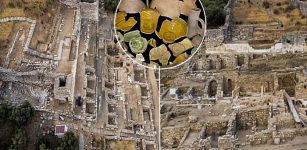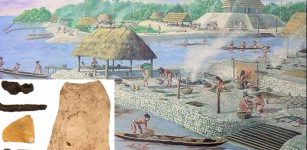Ancient Venetian Merchants Were Always Prepared For The Worst
Ellen Lloyd - AncientPages.com - Beautiful Venice in Italy is today recognized as one of the most charming cities in the world, and its ancient history is just as fascinating as this magnificent place's unique atmosphere.
J.M.W. Turner - Venice, The Dogana and San Giorgio Maggiore, 1834 - Credit: Public Domain
"In 1581, Francesco Sansovino, a Venetian who greatly admired his city, wrote that the name Venice derived from the Latin phrase Venietiam, which he said meant "come back again, and again, for however many times you come you will always see new and beautiful things." 1
This assumption concerning the origin of the name may not be accurate, but many still think Venice is like no other city in the world.
While strolling along the picturesque streets or enjoying the ride in a gondola, one can recall the daily life of 13th-century Venetian merchants who sometimes faced many dangers in the city.
A long time ago, Venice was merely a fishing village, but this small settlement eventually became one of Europe's most powerful states.
As John D. Irany writes in his book Venice in History, "the history of Venice is about simple things: the price of cloth, the design of ships, the transportation of spices and other goods. And it is about how such simple things affect the power and prosperity of nations. Like the Venetians themselves, we must approach their history from a worldview.
For hundreds of years, Venice was rich when the nations of the rest of Europe were poor. While London, Paris, and Rome were mired in the Dark Ages of Medievalism, the Republic of Venice–the Serene Republic–expanded in commerce, art, learning, and power. As such, Venice played a crucial role in the dynamic development of Europe.
In time, the changing fortunes of world events would allow other nations to challenge Venice's pre-eminent status successfully.
Bassanio, a theatrical character in Shakespeare's play "The Merchant of Venice" - Credit: Public Domain
But five hundred years ago, and for a thousand years before Columbus set sail to find a westward route to Asia, the Republic of Venice was the most exciting place. The citizens of the European nations that would later become great powers—England, France, Spain, and the Netherlands—could look only wistfully at the prosperity and wealth of the Venetians.
The Venetians readily expended their wealth on artistic and scientific achievement. Bellini, Tintoretto, Giorgione, and Titian were great masters of painting. The architects Andrea Palladio, Baldassare Longhena, and Jacopo Sansovino created churches, palaces, and even administrative offices of unsurpassed beauty. Galileo made his first astronomical discoveries while a professor at the Republic's university and later referred to his time in Venice as "the happiest years of his life."
With seemingly inexhaustible economic resources and unabated confidence in a bountiful future, Venetians built the glorious city that captivates all who see it, even today. In art, architecture, and scientific accomplishment, Venice in its time was the center of the world." 1
Though all this may give a glorying picture of Venice, one must remember life for the city's merchants during the 13th century was not always a luxury. During the 13th century, Italy was a collection of independent city-states, and to survive and prosper as a Venetian merchant, one had to have influential contacts or be friends with the most powerful families.
Using conflicts and wars to one's advantage could make a person tremendously rich. The Crusaders needed horses, soldiers, and ships. A cunning merchant would do all he could to offer transport and supplies at the highest possible price. This may sound a bit heartless, but a merchant's good life could change quickly because a failed harvest and the spread of diseases could end prosperity for a long time. Rivals and competition were a re-occurring problem in a place like Venice because this was "the city of choice for many merchants who utilized its European and Asian trade in the Holy Roman and Byzantine Empires." 2
Knowledge of the best trade routes was of utter importance if one wished to be successful, so merchants always wore a compass. Profitable goods, such as silk and spices, were highly desired products of Asia, but sweet Greek wine was also in high demand.
Even today, the first impression is often said last, and Venetian merchants take no risks when dealing with their clients. Wearing clean and fashionable clothes was a sign of confidence meant to reflect a trustworthy business person. Violence was naturally not uncommon, and carrying a dagger and a good sword was necessary. It happened when a merchant's ship or goods were stolen, and one had to defend property and sometimes life.
One can easily say Venetian merchants had to be prepared for the worst and always on their guard. Still, looking through our modern eyes, one cannot help wondering if this could have occasionally been forgotten in such a beautiful city as Venice.
Written by Ellen Lloyd – AncientPages.com
First version of this article was published on January 13, 2022
Copyright © AncientPages.com All rights reserved. This material may not be published, broadcast, rewritten or redistributed in whole or part without the express written permission of AncientPages.com
Expand for references- John D Irany - Venice in History: A History of the Serene Republic for Travelers
- Kevin McGivern – Trade, All About History, Issue 033
More From Ancient Pages
-
 Homo Erectus Was Too Lazy And Went Extinct
Archaeology | Aug 14, 2018
Homo Erectus Was Too Lazy And Went Extinct
Archaeology | Aug 14, 2018 -
 Prehistoric Bone Tool ‘Factory’ Shows Human Ancestors Had Advanced Reasoning Skills One Million Years Earlier Than Believed
Evolution | Mar 11, 2025
Prehistoric Bone Tool ‘Factory’ Shows Human Ancestors Had Advanced Reasoning Skills One Million Years Earlier Than Believed
Evolution | Mar 11, 2025 -
 Ominous Black Layer – A Geological Anomaly Or Scientific Evidence Of A Great Ancient Cosmic Catastrophe?
Ancient Mysteries | Jan 29, 2019
Ominous Black Layer – A Geological Anomaly Or Scientific Evidence Of A Great Ancient Cosmic Catastrophe?
Ancient Mysteries | Jan 29, 2019 -
 Cisterns Unearthed In Metropolis, Turkey Give Insight Into Daily Life Of Its Inhabitants 1,500 Years Ago
Archaeology | Jan 5, 2021
Cisterns Unearthed In Metropolis, Turkey Give Insight Into Daily Life Of Its Inhabitants 1,500 Years Ago
Archaeology | Jan 5, 2021 -
 Unexplained Dangerous Secret In The Great Smoky Mountains
Featured Stories | Apr 20, 2024
Unexplained Dangerous Secret In The Great Smoky Mountains
Featured Stories | Apr 20, 2024 -
 Norman Dominance Of Europe Inspired First Crusades In The Holy Land – New Book Claims
History | Sep 8, 2022
Norman Dominance Of Europe Inspired First Crusades In The Holy Land – New Book Claims
History | Sep 8, 2022 -
 Wonderful Long-Lived Nymphs In Greek And Roman Mythologies
Featured Stories | Mar 29, 2024
Wonderful Long-Lived Nymphs In Greek And Roman Mythologies
Featured Stories | Mar 29, 2024 -
 King Solomon’s Magical Shamir Could Cut Through Any Stone – Proof Of Advanced Ancient Technology?
Featured Stories | Aug 23, 2018
King Solomon’s Magical Shamir Could Cut Through Any Stone – Proof Of Advanced Ancient Technology?
Featured Stories | Aug 23, 2018 -
 Our Understanding Of Human Prehistory And Societies Is Wrong – Scientists Say
Featured Stories | Nov 3, 2022
Our Understanding Of Human Prehistory And Societies Is Wrong – Scientists Say
Featured Stories | Nov 3, 2022 -
 Oldest Door Lock Comes From Ancient Egypt
Ancient History Facts | Jun 27, 2018
Oldest Door Lock Comes From Ancient Egypt
Ancient History Facts | Jun 27, 2018 -
 First Evidence Of Canoe Burial With Remains Of A Woman Discovered In Argentinian Patagonia
Archaeology | Aug 27, 2022
First Evidence Of Canoe Burial With Remains Of A Woman Discovered In Argentinian Patagonia
Archaeology | Aug 27, 2022 -
 Controversial Ancient Book Of Veles Remains An Unexplained Mystery
Artifacts | Sep 28, 2015
Controversial Ancient Book Of Veles Remains An Unexplained Mystery
Artifacts | Sep 28, 2015 -
 Unique Structure ‘Wooden Version Of Stonehenge’ – Identified In The Perdigões Complex, Portugal
Archaeology | Aug 6, 2020
Unique Structure ‘Wooden Version Of Stonehenge’ – Identified In The Perdigões Complex, Portugal
Archaeology | Aug 6, 2020 -
 They Spoke The Language Of The Gods – Keepers Of Sacred Ancient Knowledge – Part 1
Ancient Mysteries | May 22, 2018
They Spoke The Language Of The Gods – Keepers Of Sacred Ancient Knowledge – Part 1
Ancient Mysteries | May 22, 2018 -
 Location Of Elusive Spanish Fort Is Now Verified By Florida And Georgia Archaeologists
Archaeology | Apr 24, 2020
Location Of Elusive Spanish Fort Is Now Verified By Florida And Georgia Archaeologists
Archaeology | Apr 24, 2020 -
 Lost World Of Doggerland: Parts Of Britain’s Sunken Stone Age Atlantis Discovered
Archaeology | Jul 4, 2012
Lost World Of Doggerland: Parts Of Britain’s Sunken Stone Age Atlantis Discovered
Archaeology | Jul 4, 2012 -
 Did Ancient Romans And Greeks Love As We Do? Perhaps Even More Hopelessly
Featured Stories | Jul 30, 2024
Did Ancient Romans And Greeks Love As We Do? Perhaps Even More Hopelessly
Featured Stories | Jul 30, 2024 -
 Unique 9,000-Year-Old Shrine With Symbols Discovered At Neolithic Ritual Site In Jordan Desert
Archaeology | Mar 7, 2022
Unique 9,000-Year-Old Shrine With Symbols Discovered At Neolithic Ritual Site In Jordan Desert
Archaeology | Mar 7, 2022 -
 Abundantia: Roman Goddess Who Was Shaking Her Gifts From Cornucopia – ‘Horn Of Plenty’
Featured Stories | Nov 4, 2019
Abundantia: Roman Goddess Who Was Shaking Her Gifts From Cornucopia – ‘Horn Of Plenty’
Featured Stories | Nov 4, 2019 -
 Ancient Babylonian Astronomical Records Confirm Slowing Of Earth’s Spin
Archaeology | Dec 20, 2016
Ancient Babylonian Astronomical Records Confirm Slowing Of Earth’s Spin
Archaeology | Dec 20, 2016


